Uncover the evolving landscape of sustainability in advertising. This Marketing Intelligence analysis article dissects nearly 320,000 food, drink, and beauty ads launched between 2019 and 2024, zeroing in on how sustainability claims are being used. Get targeted insights into this crucial CPG communication strategy. Eager to learn more? Download your free copy of the full analysis below!
Download free strategy insights
Time to get “Eco-Specific”: broad brush claims aren’t going to cut through with today’s consumers
Consumers’ attitudes towards sustainability have evolved substantially over the years. They’re more educated and increasingly sceptical of green claims and environmental claims made by brands. At the same time, the cost-of-living crisis means an even greater focus on value and efficacy.
However, sustainability does still matter to shoppers. For example, 73% of UK consumers try to act in a way that is not harmful to the environment (client-access only). This commitment is reflected in brand communication, and Mintel’s Marketing Intelligence analysis shows that sustainability-related claims featured in 4% of digital adspend in 2024.
Nonetheless, brand communications must evolve alongside consumers’ shifting priorities. Broad-brush green claims about sustainability no longer resonate with today’s knowledgeable consumers. Even more damagingly, they can leave brands open to allegations of greenwashing.
The evolution of sustainability marketing demands a much more targeted, specific approach to the subject. Focusing on specific initiatives and actions rather than vague promises gives brands greater differentiation, builds credibility, and makes it easier for them to own a particular territory.
Brands should embrace Eco-Specific to own their niche
Eco-specificity represents a significant evolution in sustainability marketing, where brands move from broad, generic eco-claims to highly specific, actionable sustainability initiatives tailored to their industry and consumer concerns.
By focusing on distinct topics, such as refills in beauty or responsible farming in food, brands can create differentiation, build trust, and resonate more deeply with consumers.
A key element of eco-specificity is embracing complicated issues and taking the time to explain what that means for consumers. Arla is a great example of a brand slowly taking people on a journey into responsible farming over time.
In 2021, Arla’s messaging began with farm tours and introductions to their “farmer-owner” model. Today, Arla’s latest series of adverts still champions farmers, but it also allows Arla to talk about its responsible farming in a way that is transparent and easy to understand for consumers.


Just because one brand champions an issue doesn’t mean that others can’t also play a role. M&S is another excellent example of a brand using eco-specific claims. Not only does M&S discuss regenerative farming in their advertising, but they also use it as a way to highlight their quality, local produce. This approach allows shoppers to feel like they’re not only supporting farmers but also getting a better product in the process.


Similarly, beauty brands are following similar eco-specific strategies. In 2024, the conversation on sustainability shifted from eco claims about packaging to refillable products. This trend is driven almost entirely by disruptor brands like Fussy deodorant, which are selling their refillable products as a cost-effective lifestyle choice for shoppers. On the other hand, luxury brands like Prada are jumping into the conversation by selling their refills as timeless, forever objects to have around the home.


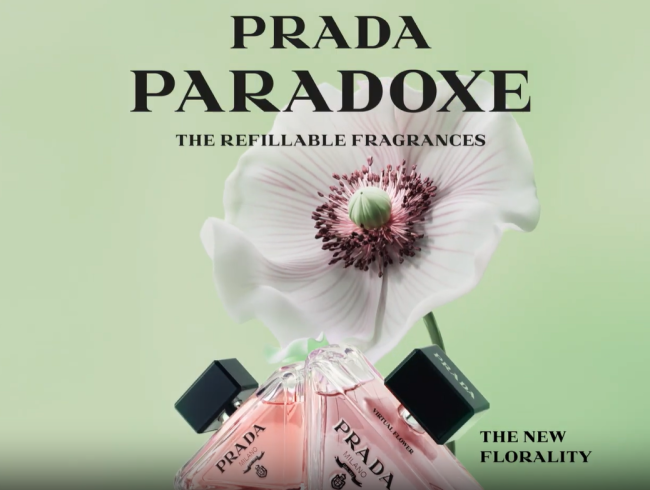

Eco-Specificity is a proven way to connect with consumers
Most people in the UK still want to support the environment, supported by a significant. 73% of UK consumers (client-access only) try to act in ways that are not harmful to the environment. However, when it comes to sustainability, most consumers aren’t “values first”, and they’re unwilling to compromise price or quality for their eco values alone.
Instead, consumers are increasingly holding brands accountable for environmental issues. Many feel that it’s the brands’ responsibility to minimise their impact on the natural world. Agreement with the statement “I expect brands to take the lead on addressing environmental issues” has risen from 60% in 2023 to 65% in 2024 (client-access only).
Environmental activism may be playing a role in this attitude shift. With 37% of British people agreeing that eco-activism has raised their awareness of environmental issues, protests such as Greenpeace’s demonstration against Unilever’s Dove brand outside their offices in London are having an impact.
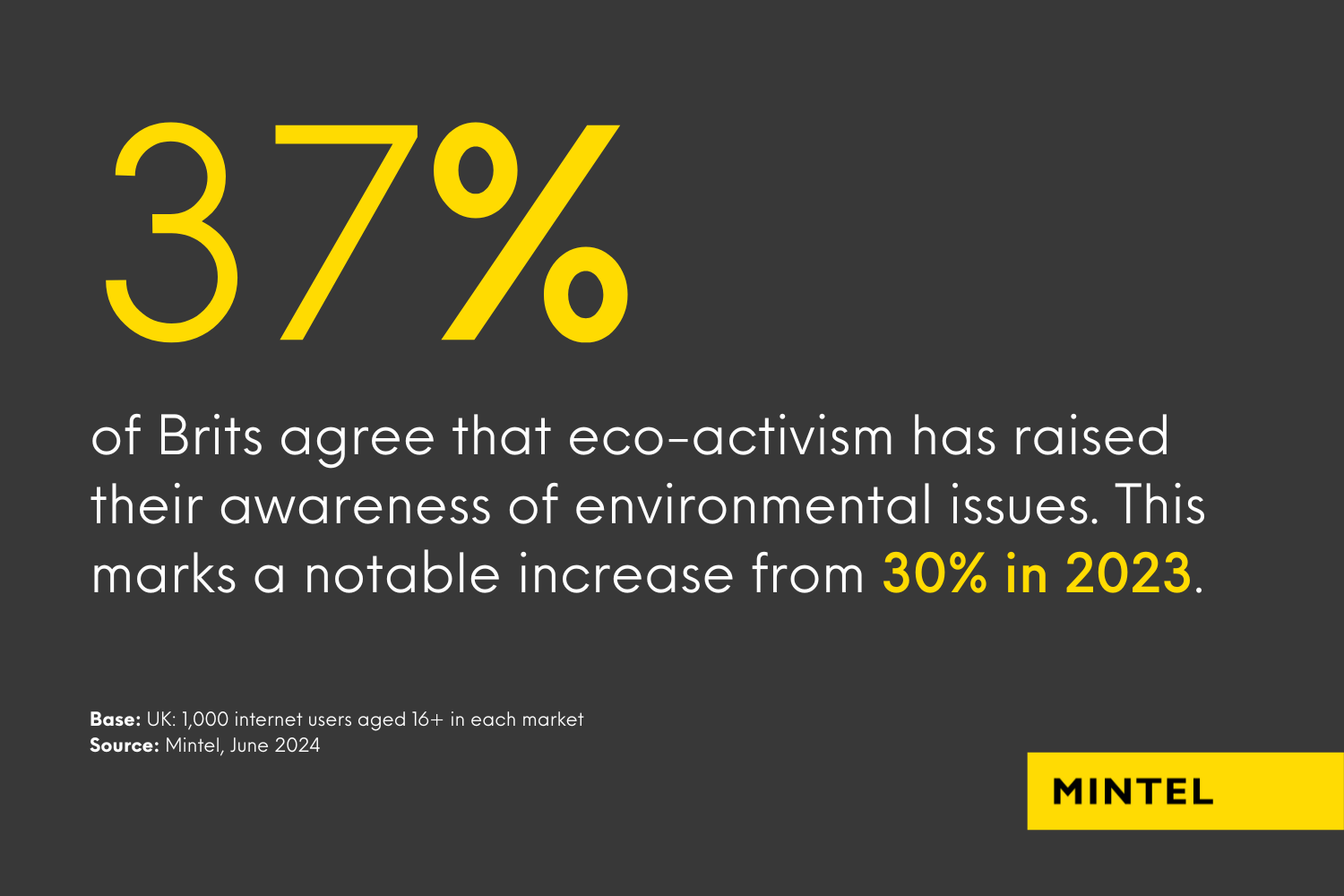

This awareness has also fueled a slow but steady rise in boycotting brands that fail to back up their sustainability marketing with action.
For brands, this is both a challenge and an opportunity. Eco-specificity is one way for brands to use transparency and issue ownership to win back the confidence of the 39% of British people who don’t trust brands to be honest about their environmental impact.
Brands who can convince shoppers that they are taking action and making change will have a huge chance to win trust, as 37% of Britons believe that “companies can do more than governments to change the world”. By taking consumers on an issue-based and transparent journey, brands can build trust, which could make all the difference when it comes to picking one product over another on the shelf.
Where did Eco-Specificity come from?
Analysis of the themes covered in sustainability marketing communications highlights how attitudes have evolved over time. Outside a pandemic-era deprioritisation, brands have maintained to allocate a consistent share of their digital ad spend on their sustainable topics, indicating that they still believe there is an opportunity to advertise these topics.
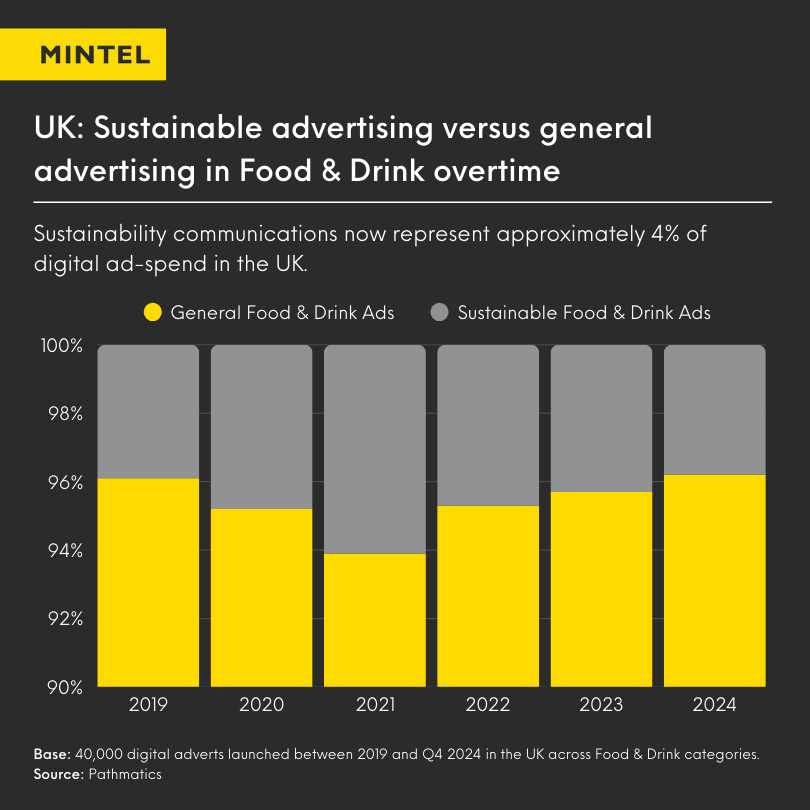



By charting sustainable adverts based on the topics within their creative copy, the shift to eco-specificity is clear in both food and drink and in beauty industries. In food and drink, the plant-based boom was in full swing in 2019. In 2024, while plant-based remained a top topic, eco-friendly packaging and responsible farming have moved up the agenda. Key eco and clean claims in the beauty market have also evolved. Following consumer demand for organic and natural products from people looking for the “clean girl” aesthetic, adverts around naturalness peaked in 2023, but in 2024 refillable products have taken centre stage.
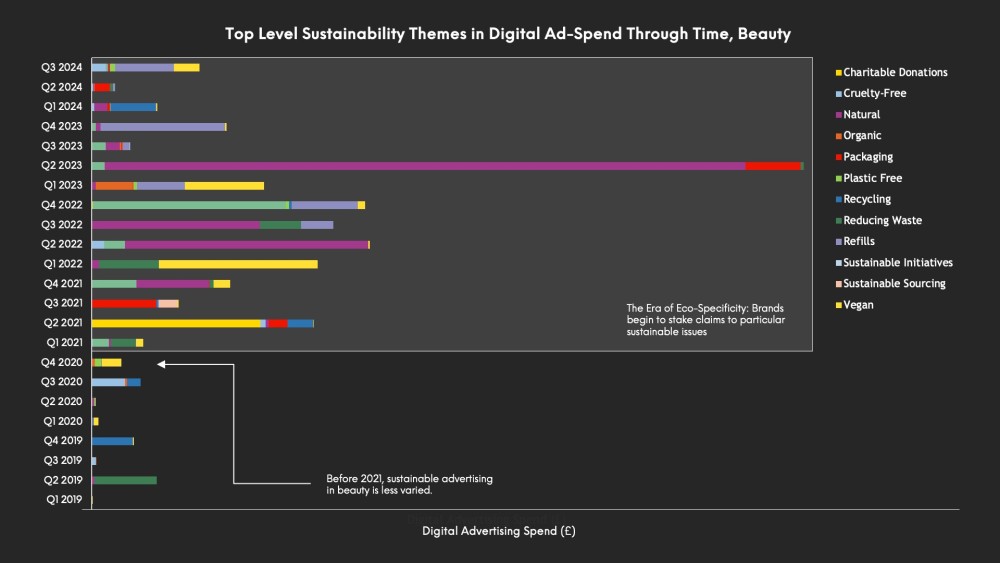

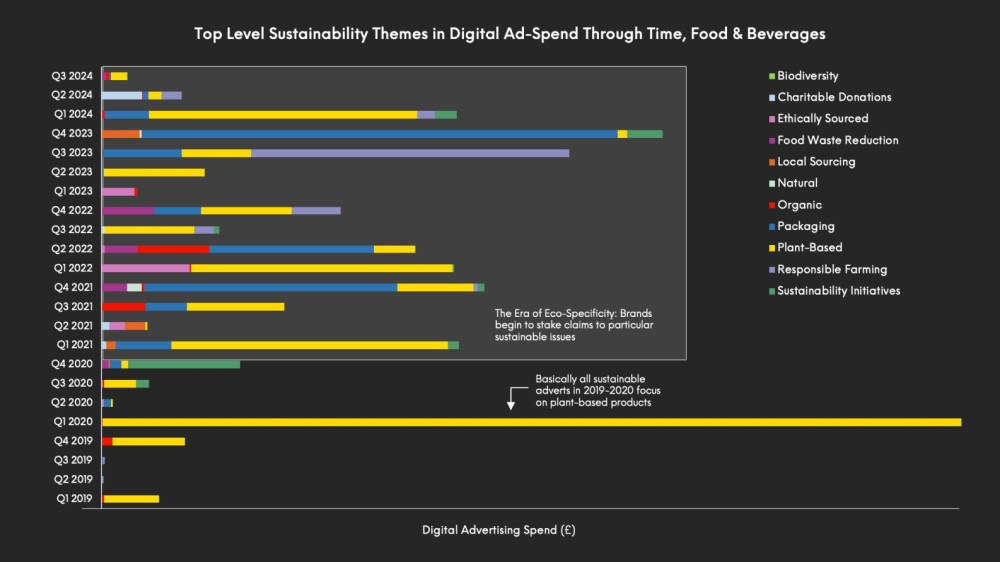

To get the full analysis behind these numbers, download your free copy below!
Download free strategy insights
The four central pillars of Eco-Specificity
Sustainability continues to be important to consumers and a point of competitive difference from brands. However, evolving to address informed eco-consumers requires an evolution to a more purpose-led, eco-specific message.
Brands today have an opportunity to create a positive relationship to sustainability by staking a claim on a sustainable issue, embracing its complexity, creating real change and ultimately, rebuilding trust with consumers.
Achieving this means that brands need to champion a sustainability message and integrate it into a long-term strategy:
- A Defined Sustainability Focus
Identify a clear, actionable environmental initiative that aligns with your brand, steering clear of generic claims and easily-manipulated issues such as carbon offsetting.
- Transparency & Proof
Back up claims with tangible actions, or measurable, contextual impact data to build consumer trust and credibility.
- Consumer Education
Clearly communicate why the initiative matters, how it benefits the planet, producers and the consumers (cost savings, health benefits, better products, better livelihoods), and what role brands and consumers can play.
- Long-Term Commitment
Avoid trend-chasing; instead, integrate sustainability into the core of the brand’s identity and maintain consistency in messaging.
Put Eco-Specificity into action with Mintel Consulting
Consumers’ attitudes towards sustainability have evolved substantially over the years. Broad brush claims aren’t going to cut through with today’s consumers. Brand communications must evolve alongside consumers’ shifting priorities. This requires a much more targeted, specific approach to sustainability messaging. This is where our Mintel Consulting team comes in.
We’re here to help you and work with you to provide fresh perspectives, and create winning strategies tailored to your individual objectives.
Similar to this Market Intelligence analysis article, we’ll help identify ways to stand out with your sustainability messaging while uncovering future growth opportunities in your category.
Reach out to the Mintel Consulting team today, and we’ll help you create a strategy that sets your brand up for long-term success.
In the meantime, download your free copy of the full analysis of the evolving landscape of sustainability in the advertisement below!
